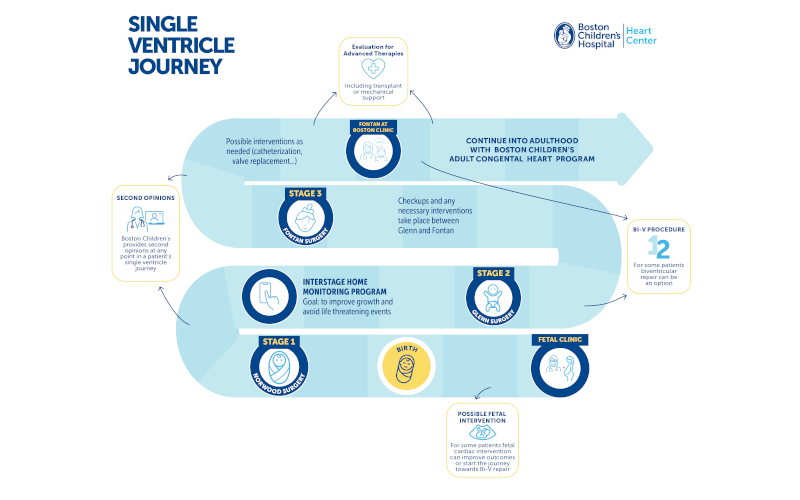The Single Ventricle Program at Boston Children’s Hospital provides care for all single ventricle heart conditions, including the most complex, in an environment that supports your whole family. Single ventricle heart defects include some of the most challenging and serious heart conditions. Children born with these complex hearts need specialized treatment and lifelong follow-up care. Our goal is to allow children born with single ventricle defects to lead fulfilling and active lives.
While each child’s single ventricle journey is unique, the image below outlines the steps you and your child might take along the way. Click on the graphic to enlarge or print it.
Our depth of experience in single ventricle hearts
Our team of clinicians are experts in diagnosing and treating all types of single ventricle heart defects. The Single Ventricle Program brings together a full range of specialized services and programs for children and adults, and will help guide you and your family through all aspects of care — from diagnosis to surgical and medical treatments to neurodevelopmental and social support. Our approach to treatment is informed by our research. Our cardiovascular researchers are focused on improving our understanding and treatment of single ventricle heart defects — giving your child access to the most advanced care possible.
Why choose the Single Ventricle Program?
Single ventricle heart defects are not all alike. The complex anatomy of the heart and its chambers make each single ventricle defect different — and each child’s journey unique. Because there may be more than one approach to treat your child’s heart, our team of experts will work with you to develop a care plan that works best for your child and your family, providing your child with comprehensive care and you with the support you need each step along the way.
Care before your baby is born
If your baby is diagnosed with a single ventricle defect prenatally, our experts in the Fetal Cardiology Program can help you understand the diagnosis and walk you through possible treatment options. Although most cardiovascular defects are treated after a baby is born, treatment before birth may be an option for some types of single ventricle heart defects.
Surgical expertise
Our experienced surgeons in the Department of Cardiac Surgery treat some of the most complex pediatric heart conditions in the world, with overall surgical success rates among the highest in the nation. Our surgeons work closely with cardiologists in the Cardiac Catheterization Program to use the least invasive treatments options whenever possible.
An option for biventricular repair
Most children with single ventricle defects undergo a series of three surgeries, called single ventricle palliation. For a subset of these patients, we are able to achieve a two-ventricle circulation through the pioneering work in our complex biventricular repair program, an option not available at other hospitals.
Interstage care and home monitoring
For those children undergoing single ventricle palliation, one of the most critical times is the period between the first and second surgeries, called the interstage period. Our Interstage Home Monitoring Program provides support for parents during this crucial time, from a team of experts in cardiology, nutrition, social work, feeding therapy, and neurodevelopment.
Providing a lifetime of heart care
Patients with single ventricle defects need to be followed by a cardiologist throughout their lives, ideally by one who understands the specific risks associated with congenital heart disease. Our Boston Adult Congenital Heart (BACH) and Pulmonary Hypertension programs provide specialized care for adult patients of all ages who have a congenital heart defect, including those living with Fontan circulation. BACH is one of the first heart programs in the country to receive accreditation from the Adult Congenital Heart Association (ACHA).



